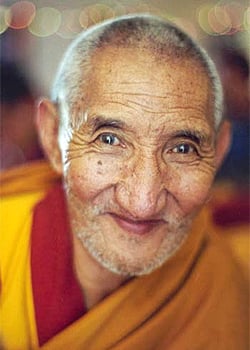| This is an excerpt from a teaching by Ribur Rinpoche at Watsonville, CA in June, 2002, translated by Fabrizio Palloti. Listen to this teaching online at Lam Rim Radio. |
 Just like me, others don’t want even the slightest suffering and they want to experience happiness, but that happiness is never enough. Therefore, myself and others are just the same.
Just like me, others don’t want even the slightest suffering and they want to experience happiness, but that happiness is never enough. Therefore, myself and others are just the same.
However, the way we think of ourselves and the way we think of others is actually quite different. We think of ourselves as extremely important, and we are constantly concerned about ourselves. We are the very focal object of our own concern. For instance, we think, “I’m hot, I’m cold, I’m not very comfortable, I need this, I don’t need that, I wish for this, I wish for that, my health, and this and that.” We are the main focus of our mind, and our thoughts revolve around ourselves, and whether we are well and happy or not.
If we compare the strength of the thoughts we have about ourselves with the thoughts we have about others, others fall into a dismissible category. We think, “I myself am very important, I need to get this and that,” but others are dismissible and we’re not very concentrated on them. Is this true or not? We are not very concentrated on others, right? We are the main focus of our life. This is a clear indication that we don’t have the thought that equalizes ourselves with others. This is the difference between equalizing ourselves with others and not equalizing ourselves with others. This is the main focus of our meditation.
How we are the same as others
The main reason why we are so obsessed with our own lives is because we have not equalized ourselves with others. We think we are different from others, but in reality we are the same, and everybody else is exactly like us. Just like us, everybody wants to be happy and does not want to suffer. Yet, we keep everybody else in a non-referential state that we don’t need to enquire about, and we are obsessed with ourselves. We need to do well, and we think, “I need to do this, I need to do that, I need to be happy, I need to get rid of this problem or that problem.” Others are totally incidental in this situation. This is the mistaken perception of the obsession that we have with ourselves. We have not realized the equality that is the actual reality for ourselves and others—that we are all the same.
This is not an easy subject to grasp, and we need to work on it really hard. This is the thought process that we must apply in our meditation session. We need to analyze, “Why do I always want to be free from suffering?” The bottom line and the basic reason why we don’t want to suffer is just that —because we don’t like to suffer. It’s just that. We don’t like suffering and we try to avoid suffering.
Just as we try to avoid suffering, so does everyone else. If we check everyone else, they are just the same as us. They don’t want to suffer, and the reason is because nobody likes to suffer. So, just as we don’t like to suffer, everybody else doesn’t like to suffer. Therefore, just as we should not suffer, in the same way, everybody else should not suffer. Why? Because they don’t like it. Do you understand?
Therefore, why should we feel that we are more important than others? Why should we keep the focus on ourselves, as if we are more important, in a situation where we are all just the same? This is the reality.
How we are different from others
What is the difference between ourselves and others? There is a difference between ourselves and others—I am just one, and others are so many. There are six billion humans on this planet, and there are so many bugs, birds and other sentient beings. Like us, they don’t like to suffer and they just want to be happy. The big difference between ourselves and others is that they are much more important from the point of view of numbers. The quantity, the amount and the weight of the suffering of others is much bigger than the weight of the suffering that lies on ourselves alone, because we are one and others are limitless. This is another reason why it is totally meaningless to be constantly obsessed with ourselves as being the most important of all, when we are actually not. This is one way of thinking and meditating in order to equalize ourselves with others.
On top of this, if we think from the point of view of nature, there is no difference. We are all sentient beings, in the nature of suffering and impermanence. We are all born and we are all going to die. We all go through struggles and suffering. From this point of view alone, we are equal and there is not the slightest reason to consider ourselves more important than others. But we should consider ourselves as the object of compassion and love, because we all have the same impermanent nature and we all have the same suffering. Our minds are contaminated with ignorance and delusions, without the slightest difference between any of us.
We should debate this within ourselves over and over again, until we grasp the situation. Suddenly, we see, “For all this time, I’ve seen myself as more important, but it’s totally baseless for these reasons.” If we can grasp this and concentrate on this, and bring it to mind again and again until our mind is imbued with it, there is a transformation.
it is entirely up to us
Following the self-cherishing mind is the source of all our suffering. We need to identify that self-cherishing mind as a demon taking over our mind and make a strong determination with very strong mindfulness, thinking, “I’m going to get rid of it.” With this determination, make a request to the guru to bless us and help us get rid of egoism, self-cherishing, and the obsession with self and with me-first.
Who has been leading us to all the trouble and suffering that we don’t want? Who has led us there? The self-cherishing mind, the self-centered thought that’s taken possession of our mind.
The bottom line is, what is this attitude of self-cherishing? It is an attitude of considering ourselves as more important and better than everybody else, or needing to achieve more than everybody else—whether it is a possession, happiness or getting rid of problems, or whatever. It is that kind of attitude that leads us and is the very cause of all our problems.
All goodness and happiness arises from wishing for others to be happy. Everything that runs smoothly and well in our lives comes from cherishing others. Whatever exists, requires causes and conditions—it doesn’t happen randomly. The same goes for our happiness. When we cherish others, we are generous and we don’t get angry with others—we practice patience, morality and non-harming.
It is entirely up to us. If we don’t want to suffer, we have to cherish others.
